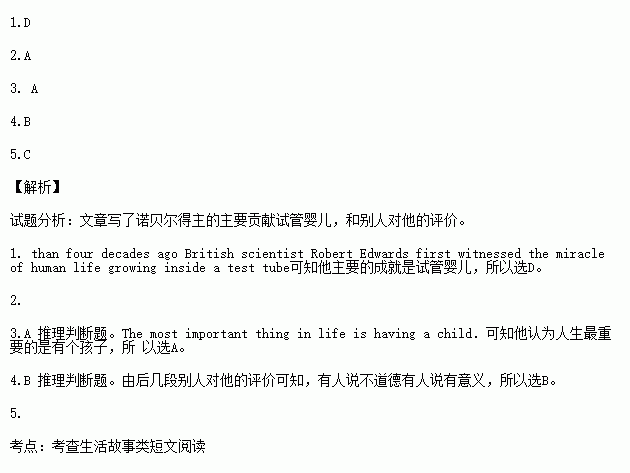题目内容
More than four decades ago British scientist Robert Edwards first witnessed the miracle of human life growing inside a test tube at his Cambridge lab. Since that ground-breaking moment, more than four million babies have been born through IVF and in 2010 his great contribution to science was finally recognized as he was awarded the Nobel Prize for medicine.
The prize for Dr Edwards, who was given a Daily Mirror Pride of Britain Award in 2008, includes a £900,000 cheque. The Nobel Assembly described IVF as a "milestone in modern medicine".
With the help of fellow scientist Patrick Steptoe, the Manchester-born physiologist developed IVF - leading to the birth of the world's first test tube baby. Dr Steptoe died 10 years later but their work has transformed fertility treatment and given hope to millions of couples.
It was a scientific breakthrough that transformed the lives of millions of couples. They said: "His achievements have made it possible to treat infertility, a disease which makes human unable to have a baby. This condition has been afflicting a large percentage of mankind including more than 10% of all couples worldwide."
Louise Brown, the world's first test tube baby, made international headlines when she was born in Oldham, Gtr Manchester, in 1978 to parents Lesley and John who had been fruitlessly trying for a baby since 1969.
Ivf-in-vitro fertilisation is the process whereby egg cells are fertilised outside the body before being implanted in the womb. After a cycle of IVF, the probability of a couple with infertility problems having a baby is one in five — the same as healthy couples who conceive naturally.
Professor Edwards, who has five daughters and 11 grandchildren, began his research at Cambridge University in 1963, after receiving his PhD in 1955.He once said: "The most important thing in life is having a child. Nothing is more special than a child." With the help of fellow scientist Patrick Steptoe, Prof. Edwards founded the Bourn
Hall clinic in Cambridge shire, which now treats more than 900 women a year. Each year, more than 30,000 women in Britain now undergo IVF and 11,000 babies are born as a result of the treatment.
But his work attracted widespread criticism from some scientists and the Catholic Church who said it was "unethical and immoral".
Martin Johnson, professor of reproductive(生殖的) sciences at the University of Cambridge, said the award was "long overdue". He said: “We couldn't understand why the Nobel has come so late but he is delighted - this is the cherry on the cake for him.”
Professor Edwards was too ill to give interviews but a statement released by his family said he was "thrilled and delighted".
1.What is Robert Edwards‘ contribution to science?
A. Challenging a disease which stops human having a baby.
B. Seeing the wonder of the first tube baby growing
C. Enabling millions of couples to live a better life.
D. Helping couples with infertility to have tube babies.
2. What does the underlined word “afflicting”(Paragraph 4)most probably refer to?
A. Troubling B. Developing
C. Improving D. Confusing
3. Why did Professor Edwards begin his research on tube baby?
A. Because he thought it of great significance to have a child in life.
B. Because the birthrate around the world was unexpectedly low then.
C. Because a special child did make a difference to an ordinary family.
D. Because his fellow scientist wanted to give hope to the unlucky couples.
4.It can be inferred from Paragraph 8 and Paragraph 9 that ___________.
A. some people envied Professor Edwards for his being awarded.
B. different opinions were voiced on Professor Edwards‘ finding.
C. Professor Edwards deserved the prize for his breakthrough.
D. the prize was late because the finding was first considered immoral.
5. What might be the best title for the passage?
A. Life Stories of Robert Edwards
B. Preparations for Having a Baby
C. Nobel Prize for IVF Expert Edwards
D. Treatment of Infertility in a Lab
 智趣寒假作业云南科技出版社系列答案
智趣寒假作业云南科技出版社系列答案
